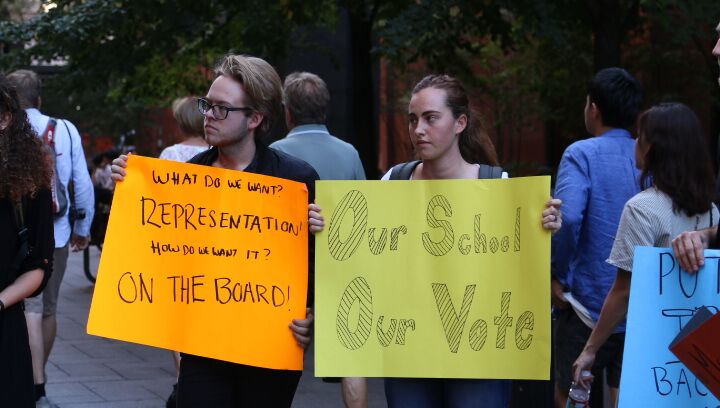Despite Resistance, SLAM For Student Representation on Board of Trustees
Earlier in the semester SLAM members protested the student voice should be heard on the Board of Trustees.
November 30, 2016
NYU’s Student Labor Action Movement is continuing its efforts to get a student representative on the Board of Trustees, notwithstanding President Andrew Hamilton’s pushback on the initiative in a WSN interview published on Monday.
Despite agreeing the Board of Trustees could benefit from greater diversity, Hamilton said that having students on the Board poses a conflict of interest, seeing how they would be directly affected by the board’s decisions.
SLAM had been working on this effort since Sept. 24 this year, when it hand-delivered a petition to the Board of Trustees requesting student representation. The petition garnered over 500 signatures with the help of the Student Senators Council as well as activist organizations such as NYU Divest, the Incarceration to Education Coalition, Faculty Against the Sexton Plan and the NYU College Democrats.
Gallatin senior Katie Shane, a prominent organizer within SLAM, said it is important to have student representation on the Board of Trustees because of how much influence it has.
“We think it’s important, because they have meetings that students are not allowed to be a part of, and yet they have the ultimate decision-making power at the university,” Shane said. “So shouldn’t the interests of the students be represented?”
She believes that the university needs student representation on all levels, since it will increase both transparency and democracy at NYU.
CAS senior Drew Weber, another SLAM member, isn’t fazed by Hamilton’s comments regarding the movement, and said he is confident in the proposal’s success because of widespread student support for the proposal and the precedents set by other universities.
“Our proposal is very closely modeled on the one that exists at Cornell where they have selected student trustees on their board,” Weber said. “We have history on our side, we have facts on our side and we have students on our side.”
NYU spokesperson Matt Nagel said the board listens to the voices of students, faculty and staff, and meets regularly with the Student Senators Council as well as faculty committees. He added that the board as it stands aligns with the standards of the Association of Governing Boards given the significant alumni presence on the board, which the university feels gives fair representation to student views.
“In recent years, the board has specifically made an effort to add young alumni, bringing the perspective of very recent experience as students into its deliberations,” Nagel said. “It is important to note that NYU is like the vast majority of private universities — roughly 80 percent — in that it does not have a student on the board.”
He said the university tries complying, recognizing and enacting student demands, such as with the $15 minimum wage raise last year and revising its Common App review process for Ban the Box over the summer.
However, SLAM members such as Gallatin junior Brennan O’Rourke still disagree with the position of the administration and board. He said that student representation on the Board of Trustees would not create a conflict of interest, which the Board thinks could happen.
“It’s also important to point out that a lot of the members on the Board of Trustees have their own conflicts of interest, and they can put those conflicts of interest aside,” O’Rourke said. “I don’t think that real listening is happening, and we think that students on the Board of Trustees affords them a level of trust and respect that can’t be avoided when they have their committee meetings.”
He says that having students on the Board of Trustees who can help make decisions can positively impact NYU.
For now, SLAM is playing the waiting game, hoping that the university is willing to hear out their concerns as they have in the past.
Email Herman Lee at [email protected].
























































































































































